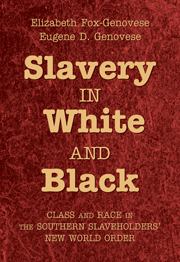Book contents
- Frontmatter
- Contents
- Preface
- Manuscript Collections Cited
- List of Abbreviations
- Slavery in White and Black
- Introduction
- 1 The Impending Collapse of Capitalism
- 2 Hewers of Wood, Drawers of Water
- 3 Travelers to the South, Southerners Abroad
- 4 The Squaring of Circles
- 5 The Appeal to Social Theory
- 6 Perceptions and Realities
- Afterword
- Index
Introduction
Published online by Cambridge University Press: 05 June 2012
- Frontmatter
- Contents
- Preface
- Manuscript Collections Cited
- List of Abbreviations
- Slavery in White and Black
- Introduction
- 1 The Impending Collapse of Capitalism
- 2 Hewers of Wood, Drawers of Water
- 3 Travelers to the South, Southerners Abroad
- 4 The Squaring of Circles
- 5 The Appeal to Social Theory
- 6 Perceptions and Realities
- Afterword
- Index
Summary
In everything, it is the nature of the human mind to begin with necessity and end in excess.
—Pliny the ElderElizabeth Fox-Genovese and I long insisted that the presuppositions of the southern defense of slavery ended with Slavery in the Abstract – the doctrine that declared slavery or a kindred system of personal servitude the best possible condition for all labor regardless of race. Proslavery logic cast enslavement, broadly defined, as necessary and proper for much of the white race, as well as for practically all of the black race. A vital question has remained unanswered: To what extent did so extreme a doctrine take root among slaveholders and nonslaveholders?
The expression “Slavery in the Abstract” roiled southern politics. It had several meanings, the most intriguing of which referred to a social system abstracted from race and best for whites as well as blacks. We here follow that meaning, but the principal alternative requires identification and explanation. A good many Southerners used the term to distinguish between support for specifically black slavery and support for slavery in principle. They rejected the resort to philosophical abstractions as akin to ideological special pleading. Theodore Dwight Bozeman, a gifted American historian, remarks that the Old School Presbyterians – Calvinistic Baconian advocates of induction – used words like “abstract,” “theory,” and “metaphysics” as “virtual obscenities.” Bozeman's observation also applies to Methodist Arminians and to secular intellectuals. Southern distaste for abstractions extended to all philosophic systems – Hegel's for example.
- Type
- Chapter
- Information
- Slavery in White and BlackClass and Race in the Southern Slaveholders' New World Order, pp. 1 - 10Publisher: Cambridge University PressPrint publication year: 2008



